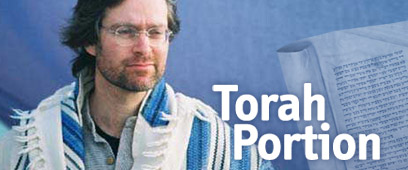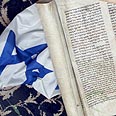

27 Then he said, “Let me go, for the sun has risen.”
But (Jacob) answered “I will not let you go until you bless me.”
28 Said the other, “What is your name?”
He replied, “Jacob.”
29 Said (the man), “Your name will no longer be Jacob - it will be Israel, for you have struggled with God and man and you have prevailed.”
A strange passage: sparse, unclear, full of unanswered questions, as if the writing itself is bathed in the uncertain half-light of pre-dawn. Who is this stranger? With whom does Jacob wrestle throughout the night?
Four possibilities emerge and together they unfold a sense of the deeper story.
Rashi, medieval scholar of the biblical text, suggests that the wrestling partner is none other than the angel of Esau. - Now Rashi is not talking about angels of the Hallmark variety, the word ‘angel’ means a symbolic representation of the spiritual essence of Esau. Rashi’s implication is that before Jacob can go home, he must come to terms with what his twin brother Esau represents to him. Before the face to face encounter with Esav Jacob must first go through a dark night of the soul.
Rashbam, Rashi’s grandson, disagrees. He posits that Jacob at this point is getting ready to flee and avoid the confrontation with his brother. The man, the angel, holds him back, thereby forcing him to confront that which he is so desperately seeking to escape. Jacob has fled before. As we saw, he ran from Esau to the house of Laban, and he fled Laban without a farewell. He will flee again, from the city of Shechem- the city that rapes his daughter and is massacred by his sons. It is highly plausible that Jacob might attempt to run again. But the mysterious stranger has caught him, compelling him to break the pattern and confront his reality. By injuring his leg the angel denies Jacob his favored means of escape- running.
These two interpretations taken together begin to point us to a third and deeper meaning suggested in the Midrash: the mysterious man with whom Jacob battles throughout the night is none other than Jacob himself. In the darkness of fear and uncertainty Jacob is wrestling with himself, wrestling with his own fate.
How does the stranger himself understand what happened on that strange night? “Sarita im elokim - you have struggled with God,” he says to Jacob. Sarita is the root of the word Israel. Israel then means to struggle with God. Elokim, the name used for God in this text, is the impersonal name of God: the God of physical creation and of the cosmos. This is the God of fate, representative of the uncertain forces of family, nature, and history which control our reality against our will. In struggling with himself Jacob is also Sarita im Elokim - struggling with the Creator of an impersonal world that offers no clear or easy answers.
In a stunning, dense image, Jacob is both wrestling with God and wrestling with his own fate. In wrestling he is attempting to transform his fate into destiny: to own and somehow fashion his own personal path through life. Jacob is struggling with an often cold, seemingly mechanical reality and with our lack of ability to control our destinies. Standing alone, Jacob wrestles with uncertainty.
While the Judah Moment emerges from a place of core certainty, of feeling safe in God’s presence, Jacob’s transformation into Israel - the Israel Moment – requires him to touch the core uncertainty of being. The Israel Moment is not about reassurance: it is about struggle - with human beings, with fate, with God and with self. The Israel moment is no less religiously vital or spiritually passionate than the Judah moment. Only the pendulum of dialectic swinging between the Israel and Judah typologies can foster an authentic homo religiosus.
No such thing as wrestling at a distance - to struggle is to embrace
Rashi explains “Vayeavek” the Hebrew word for struggle in this text with one intriguing and elliptical phrase - to struggle is to embrace .
The beauty of the Israel Moment is that it offers us such a rich physical reminder that struggle cannot come from a place of distance. All wrestling, all struggle, takes place in intimacy. As we picture Jacob grappling with the stranger in the dark and the dust we understand that while Judah’s experience of God may be calmer, Jacob, the wrestler is in no less intimate contact with God through struggle. The essence of struggle is of course uncertainty.
In order to fully grasp the Israel moment, Israel meaning “to struggle with God”, we need to combine Rashi’s understanding of struggling as embracing with a mystical tradition of encountering God. The tradition is rooted in a verse from the Book of Job, a verse which served as an essential guide to spiritual understanding for the Kabbalists. The verse is, “Through my flesh I vision God” . For the earlier Kabbalists this meant that the human form- supernal man - was the model necessary to unravel the mysteries of the divine lights. Later Kabbalists, particularly in the Chasidic movement, expanded their understanding of the verse to mean that the contours of human psychology are in some sense the contours of divinity. Put simply, this means that human experience partakes in the divine. To the extent that divinity is being, this means that we access the ontology of being through the subjectivity of psyche. Our deepest experiences, longings and intuitions, as well as our physical experiences, are the ultimate source of information about divinity.
Employing this interpretive key we can now re-read Rashi’s comment about the Jacob story- “To struggle is to embrace”. The spiritual principle of “Through my flesh I vision God” suggests three distinct yet complementary ways of understanding Rashi.
Physically: When I wrestle with someone it is precisely the same action as embracing them. The image of two people locked in struggle, wrestling, is almost identical to that of two people locked in embrace, hugging.
Linguistically: The language itself plays the same visual games. The Hebrew words for ‘struggle’ (A-B-K) and ‘embrace’ (Ch-B-K) derive from the same two-letter root, B-K. Rashi etymologically links lechobko and leovko: “to struggle is to embrace”.
Existentially: To wrestle is to be engaged, to be fully involved. Even in anger there is the same ambiguity. How many times have we pretended to ourselves that we hate somebody, that we are not interested in somebody, that they have hurt us and so we no longer care for them? And how long has it taken before we have understood that in holding on to our anger we are holding on to the relationship? Anger keeps us locked in embrace, wrestling with the past. Letting go of anger is far more than forgiveness: it is an act of self-liberation. Stay angry, and you stay in the relationship, still entangled in the soul of another from whom you must separate.
Jacob does not give up on his struggle, nor does he separate from it: he merges with it. The outcome of his battle with the stranger is that Jacob is renamed Israel, the combination of two words - Yashar-El – meaning Straightness of God as well as Struggle with God. The word straight here is in the sense of a “straight person”- a person of integrity. Jacob becomes a person with the integrity of divinity.
Jacob’s new identity is now intimately linked with the name of God. Forged in the fire of the nightlong battle, Jacob is now welded to his struggling embrace. Jacob’s wrestling is not about alienation and distance, nor is it an escape from a life of the spirit: Jacob’s night wrestling is about his journey towards God.
In the struggle Jacob has a vision of God- “for I have seen God face to face”. Philo explains the word Israel in a third sense – Yeshur El – meaning ‘to see God’. All three understandings merge into one. The integrity born of genuine struggle is the gateway to epiphany – to the vision of God, which is the highest goal of biblical consciousness















